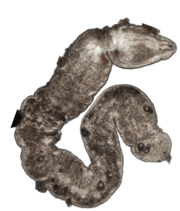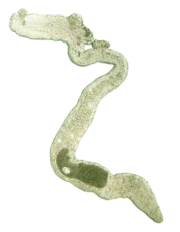Nemertodermatida
Nemertodermatida is a class of Acoelomorpha, comprising 18 species of millimetre-sized turbellariform, mostly interstitial worms.[1]
| Nemertodermatida | |
|---|---|
 | |
| Scientific classification | |
| Kingdom: | Animalia |
| Phylum: | Xenacoelomorpha |
| Subphylum: | Acoelomorpha |
| Class: | Nemertodermatida Karling, 1940 |
Taxonomy
The order Nemertodermatida contains two families with 6 genera.[2] The high level of cryptic diversity in this meiofauna group however implies that the number of nemertodermatid taxa may be underestimated.[3]
Ascopariidae
The family Ascopariidae Sterrer, 1998[4][5] contains two genera.[2]
- Ascoparia Sterrer, 1998
- Flagellophora Faubel & Dorjes, 1978
There are 3 species in the family Ascopariidae.[2]
| Name[lower-alpha 1] | Image | Distribution | Description |
|---|---|---|---|
| Ascoparia neglecta Sterrer, 1998 | |||
| Ascoparia secunda Sterrer, 1998 | |||
| Flagellophora apelti Faubel & Dorjes, 1978 | |||
Nemertodermatidae
The family Nemertodermatidae Steinböck, 1930 contains four genera.[2]
- Meara
- Nemertinoides
- Nemertoderma
- Sterreria
There are 15 species in the family Nemertodermatidae.[2]
| Name[lower-alpha 2] | Image | Distribution | Description |
|---|---|---|---|
| Meara stichopi Westblad, 1949 |
 |
||
| Nemertinoides elongatus Riser, 1987 |
 |
||
| Nemertinoides glandulosum Meyer-Wachsmuth, Curini Galletti & Jondelius, 2014 |
 |
||
| Nemertinoides wolfgangi Meyer-Wachsmuth, Curini Galletti & Jondelius, 2014 |
 |
||
| Nemertoderma bathycola Steinböck, 1930 |
|||
| Nemertoderma westbladi (Westblad, 1937) Steinbock, 1938 |
|||
| Sterreria boucheti Meyer-Wachsmuth, Curini Galletti & Jondelius, 2014 |
|||
| Sterreria lundini Meyer-Wachsmuth, Curini Galletti & Jondelius, 2014 |
|||
| Sterreria martindalei Meyer-Wachsmuth, Curini Galletti & Jondelius, 2014 |
 |
||
| Sterreria monolithes Meyer-Wachsmuth, Curini Galletti & Jondelius, 2014 |
|||
| Sterreria papuensis Meyer-Wachsmuth, Curini Galletti & Jondelius, 2014 |
|||
| Sterreria psammicola (Sterrer, 1970) |
 |
||
| Sterreria rubra (Faubel, 1976) |
 |
||
| Sterreria variabilis Meyer-Wachsmuth, Curini Galletti & Jondelius, 2014 |
 |
||
| Sterreria ylvae Meyer-Wachsmuth, Curini Galletti & Jondelius, 2014 |
 |
||
Notes
- A binomial authority in parentheses indicates that the species was originally described in a different genus.
- A binomial authority in parentheses indicates that the species was originally described in a different genus.
gollark: Maybe your computers are just bad.
gollark: I see. Weird.
gollark: Isn't that just because they have the same CPU architecture or something?
gollark: If the utter bees at Sony and Microsoft didn't lock them down a ton, consoles would make good home servers.
gollark: (osmarks.net is not high traffic)
References
| Wikispecies has information related to Nemertodermatida |
- Nielsen C (2012). Animal Evolution: Interrelationships of the Living Taxa. Oxford and New York: Oxford University Press. pp. 69–70. ISBN 978-0-19-960602-3.
- Tyler S (2010). "Isodiametridae". World Register of Marine Species. Retrieved May 16, 2019.
- Meyer-Wachsmuth I, Curini Galletti M, Jondelius U (2014-09-16). "Hyper-cryptic marine meiofauna: species complexes in Nemertodermatida". PLOS ONE. 9 (9): e107688. doi:10.1371/journal.pone.0107688. PMC 4166464. PMID 25225981.
- Tyler S, Schilling S, Hooge M, Bush LF (2006–2016). "Nemertodermatida". Turbellarian taxonomic database. Version 1.7. Retrieved 2016-02-03.
- Zhang Z (2011-12-23). "Animal biodiversity: An outline of higher-level classification and survey of taxonomic richness". Zootaxa. Magnolia Press. 3148: 1–237. Retrieved 2016-02-03.
This article is issued from Wikipedia. The text is licensed under Creative Commons - Attribution - Sharealike. Additional terms may apply for the media files.